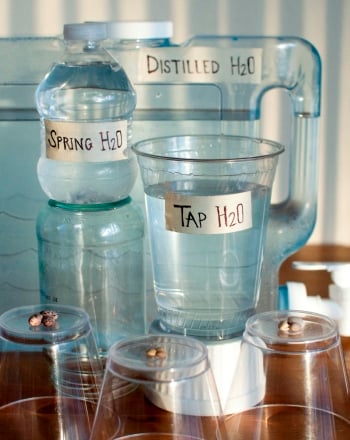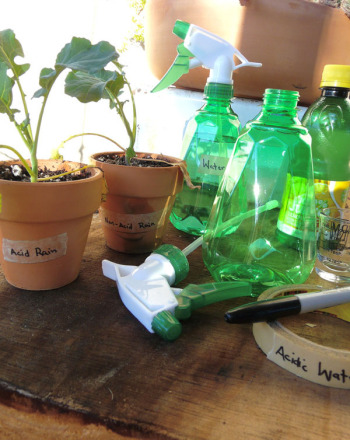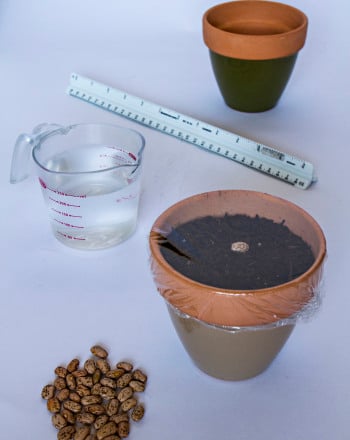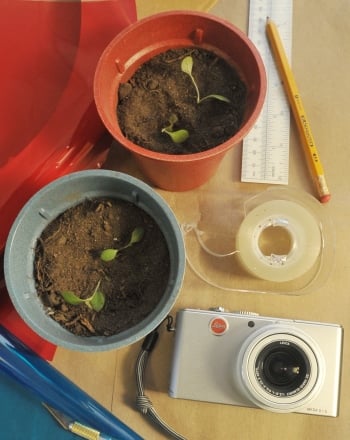Science project
Determine the Effect of Gray Water on Plant Growth
Greywater, also spelled gray water, is considered wastewater by most people. However, it’s beginning to be treated and used as fresh water around the world in places dealing with growing populations but shrinking amounts of fresh water. Greywater is the used water from showers, baths, hand washing, laundry, and dishes. It does not include sewage water, like water from toilets, which is called blackwater.
Greywater is non potable, which means it is unsafe to drink. It can contain many harmful things, like chemicals from soap, shampoo, and dish liquids, to food particles, bacteria, and whatever dirt or germs you wash from your hands and body. In most households, the water that fills our toilets is unnecessarily potable (drinkable) water, and many communities are considering recycling greywater to flush toilets. But how safe is soapy water on plants?
Problem
Determine whether greywater can be used to water plants.
Materials
- Greywater collected from different sources
- Fresh, potable water
- Empty plastic water bottles
- Small pots for planting
- Potting soil
- Pinto bean seeds
- Labeling tape
- Ruler
Procedure
- First, make your hypothesis. Can greywater be used to water plants? Does the type of greywater determine whether or not a plant will grow? What is the general relationship between greywater and plant growth?
- Collect greywater from different sources in labeled plastic bottles. This could be water you washed your hands in, water from washing dishes, bathtub water, or any other greywater source you can think of.
- Plant your seeds. Put 1-2 seeds in each pot with potting soil. Label your containers with the type of water you will water them with.
- Water each plant with the same type of water each day. Be sure to have a control group that is watered with fresh water. Be sure to water each plant with the same amount of water, regardless of the type of water being used.
- Measure the height of the plants once they begin to sprout. Record the date and height and measure daily.
- Compare which types of water help plants grow the best.
- Make other observations. Do you notice any difference in color from one plant to the next? Do you notice any differences in turgidity, or a plant’s ability to stand upright?
Results
The fresh water will most likely produce the tallest plant. Depending on what is dissolved in the greywater, plants watered with greywater may or may not grow.
Why?
Many products now are labeled “green,” which often means they are environmentally friendly and biodegradable. Water with these types of dissolved chemicals may not be as harmful as water with normal types of soap and shampoo, which are likely to poison plants.
Many communities treat their greywater and use the water to irrigate landscapes and inedible plants. Avoid using greywater on plants that come into contact with people as this type of water could pose a health risk.
Education.com provides the Science Fair Project Ideas for informational purposes only. Education.com does not make any guarantee or representation regarding the Science Fair Project Ideas and is not responsible or liable for any loss or damage, directly or indirectly, caused by your use of such information. By accessing the Science Fair Project Ideas, you waive and renounce any claims against Education.com that arise thereof. In addition, your access to Education.com's website and Science Fair Project Ideas is covered by Education.com's Privacy Policy and site Terms of Use, which include limitations on Education.com's liability.
Warning is hereby given that not all Project Ideas are appropriate for all individuals or in all circumstances. Implementation of any Science Project Idea should be undertaken only in appropriate settings and with appropriate parental or other supervision. Reading and following the safety precautions of all materials used in a project is the sole responsibility of each individual. For further information, consult your state's handbook of Science Safety.













